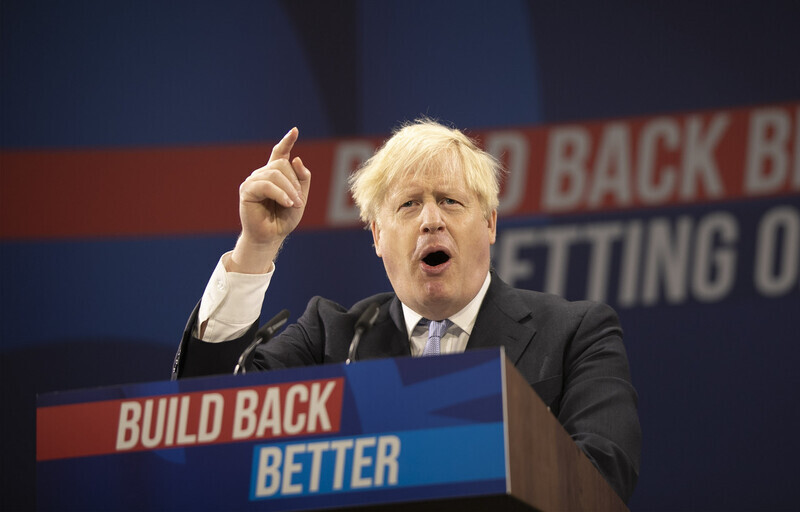hankyoreh
Links to other country sites 다른 나라 사이트 링크
[Column] Money and politics: The UK’s Conservative Johnson government in the spotlight


The United Kingdom might proudly claim to be one of the oldest democracies in the world, but it still struggles with one of the oldest problems in politics — a cozy relationship between those in power and those with huge financial resources and business interests. In the public eye, the word “corruption” comes to mind, and many people are losing trust in politicians and democracy.
Campaigning for political office is expensive, and with very limited access to public funding, UK political parties rely on membership fees and, especially, donations. Parties can make efforts to increase their membership for greater financial resources, and the British Labour Party has been successful in this regard in recent years. But there are limits to increasing membership. Thus, attracting donations has become an imperative in the face of the spiraling costs of political campaigning.
To fill their “battle chest,” the UK’s Conservative Party had a cunning plan. It created a secretive club for those donors who had given at least 250,000 pounds (roughly US$336,000) to the party. These donors have privileged access to Prime Minister Boris Johnson and his Chancellor of the Exchequer Rishi Sunak — allegedly monthly meetings and calls with the residents of Downing Street, in which the rich and wealthy have pushed for cutting public spending and taxes among others.
Whilst the Conservative Party was forced to admit that this secret donor club exists, it denied any influence on public policy. The critical observer might wonder why this group is internally known as the “Advisory Board” — a troubling name for this elite group of donors to the Conservative Party. If you cannot quite afford 250,000 pounds, a so-called “Leaders Group” — with membership at 50,000 pounds — provides you regular private dinners with the prime minister and other Cabinet members.
It does not stop here — not only money for the party, but also money for politicians. We nearly became used to former politicians using their contacts for business lobbying. The former Prime Minister David Cameron, also of the Conservative Party, received 3.3 million pounds from a collapsed financial services company; and his “tasks” included pressing his Conservative friends in government to make public COVID-19 support available to his new employer.
Owen Paterson, a former secretary of state for the environment, received at least 500,000 pounds from two companies; but unlike Cameron, Paterson was still a member of Parliament. The Parliament’s watchdog concluded that Paterson had broken parliamentary standards when he repeatedly lobbied public officials on behalf of these companies.
For this paid advocacy, however, the accused showed no remorse whatsoever, and the Conservative government agreed. They ordered their MPs to vote against sanctioning Paterson, and instead, they initiated an overhaul of Parliament’s Standards Committee. Apparently, it was a thorn in the government’s side that the committee was not dominated by the governing party. Within 24 hours, the government U-turned when public opinion soured, and Paterson resigned from his post.
The Paterson scandal might be over, but uncomfortable questions remain. Why does the government attack the watchdog for Parliamentary standards? Because Boris Johnson himself has been in the firing line.
Questions were raised over the source of 58,000 pounds for the refurbishment of his Downing Street flat, and he has been criticized for free holidays in the Caribbean and Spain. These episodes of eroding standards in public life only show the vital importance of strong institutional and independent structures that can hold public office holders to account, but also strong public scrutiny. Here, the press has a huge responsibility to invest money into investigative journalism to uncover and expose wrongdoing.
Social media provides ordinary citizens with a new means to express their discontent, but only if the public expresses their discontent most strongly, will notice be taken. We still do not know who has participated in private meetings and dinners in Downing Street — even though the party promised to release the names of their so-called Leaders Group, for instance.
Once public scrutiny moved on, the party could afford to ignore transparency. However, they misjudged the Paterson scandal — public outcry exceeded their expectations, and they were forced to drop their plan to make standards scrutiny party-political. Much of the public might have lost faith in politics and they almost expect wrong behaviors, but it is still ready to push back. This needs to continue, and more forcefully at that, in the UK and elsewhere.
Please direct questions or comments to [english@hani.co.kr]

Editorial・opinion
![[Editorial] Perilous stakes of Trump’s rhetoric around US troop pullout from Korea [Editorial] Perilous stakes of Trump’s rhetoric around US troop pullout from Korea](https://flexible.img.hani.co.kr/flexible/normal/500/300/imgdb/original/2024/0509/221715238827911.jpg) [Editorial] Perilous stakes of Trump’s rhetoric around US troop pullout from Korea
[Editorial] Perilous stakes of Trump’s rhetoric around US troop pullout from Korea![[Guest essay] Preventing Korean Peninsula from becoming front line of new cold war [Guest essay] Preventing Korean Peninsula from becoming front line of new cold war](https://flexible.img.hani.co.kr/flexible/normal/500/300/imgdb/original/2024/0507/7217150679227807.jpg) [Guest essay] Preventing Korean Peninsula from becoming front line of new cold war
[Guest essay] Preventing Korean Peninsula from becoming front line of new cold war- [Column] The state is back — but is it in business?
- [Column] Life on our Trisolaris
- [Editorial] Penalties for airing allegations against Korea’s first lady endanger free press
- [Editorial] Yoon must halt procurement of SM-3 interceptor missiles
- [Guest essay] Maybe Korea’s rapid population decline is an opportunity, not a crisis
- [Column] Can Yoon steer diplomacy with Russia, China back on track?
- [Column] Season 2 of special prosecutor probe may be coming to Korea soon
- [Column] Park Geun-hye déjà vu in Yoon Suk-yeol
Most viewed articles
- 1Korea likely to shave off 1 trillion won from Indonesia’s KF-21 contribution price tag
- 2Nuclear South Korea? The hidden implication of hints at US troop withdrawal
- 3[Editorial] Perilous stakes of Trump’s rhetoric around US troop pullout from Korea
- 4With Naver’s inside director at Line gone, buyout negotiations appear to be well underway
- 5In Yoon’s Korea, a government ‘of, by and for prosecutors,’ says civic group
- 6[Column] ‘Choson’: Is it time we start referring to N. Korea in its own terms?
- 7‘Free Palestine!’: Anti-war protest wave comes to Korean campuses
- 8How many more children like Hind Rajab must die by Israel’s hand?
- 9Overseeing ‘super-large’ rocket drill, Kim Jong-un calls for bolstered war deterrence
- 10[Photo] ‘End the genocide in Gaza’: Students in Korea join global anti-war protest wave